




On Thursday, Feb. 22, the USUSA academic senate, executive leadership board and government relations council visited Utah’s public servants and legislators for Aggie Ice Cream Day. Students arrived at the Utah Capitol around 1 p.m. and delivered ice cream to offices throughout the building.
At lunch, students heard from USU President Elizabeth Cantwell and vice president of government and external relations Devin Wiser.
“Getting involved and engaged at this level where you are right now truly makes a difference and changes the trajectory of your path, so I encourage you to keep going,” Wiser said.
Cantwell even promoted a new Aggie Ice Cream flavor that she designed, coming out on April 12.
“Come to my investiture, get some Aggie Ice Cream for President Cantwell, and let me know what you think,” Cantwell said.
Three of the five candidates running for 2024-25 USUSA President — Jake Russell, Jamie Parry and Sarah Pope — were present. Russell and Parry were representing the GRC, while Pope attended representing USUSA as the graduate studies senator.
“It’s really helpful to build those relationships in order for representatives to understand the importance of
higher education. I think this year has been very interesting and their legislation regarding care and education,” Parry said. “Being here at Aggie Ice Cream Day means being a student that’s interacting one-on-one with them, and hopefully being able to let them know that student voices should be the priority in that legislation.”
While Aggies were at the Capitol, two separate protests were happening. The first was in response to HB257, also called the bathroom bill. Two protests have been held on USU’s campus this past semester in response to the bill.
The second protest was against HB29, which allows books to be banned from schools if two or more Utah school districts agree to do so. The bill was passed by the House on Wednesday, Feb. 21.
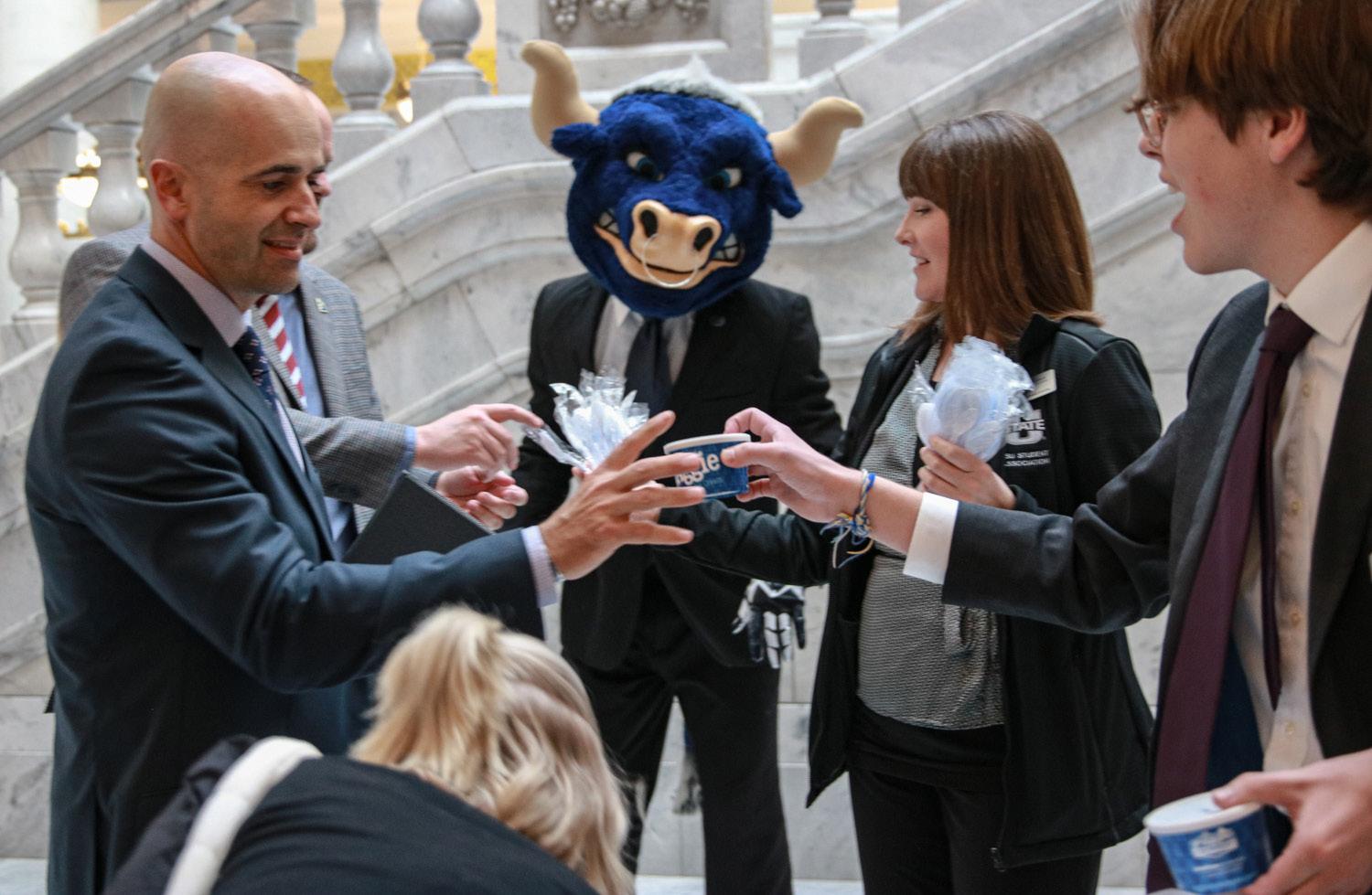
“To see people like actively participating in politics, to see them coming to the Capitol and actively trying to do something about their rights and what they believe — regardless of what your beliefs are, I think we can all relate to that story of trying to stick up for our beliefs and act on doing something about what we believe should change,” said GRC member Abby Hansen.
While at the Capitol, members of USUSA and the GRC reflected on when they first felt like Aggies.

“I transferred to Utah State my sophomore year, and it was just so vastly different from my other university experience,” said Fran Simpson, senator for the Caine College of Arts. “I immediately felt welcomed, and there were also opportunities to get involved.”
Russell said he first felt he was an Aggie during his first month at Utah State.
“The Big Agg Show 2022, my first month at Utah State. I was at the rail during the concert, was moshing with everybody. And I was like, ‘Holy crap, I go to the school with all these people.’ It was so fun,” Russell said.
Parry said her time as activities director and a member of the GRC has helped her feel like an Aggie. “Being here and being an Aggie is super awesome because being an Aggie means being in a community of people that are awesome,” Parry said.

Malory Rau is a sophomore studying social media, public relations and marketing. When not skateboarding with friends, she is usually thrifting, reading or seeing the latest movie. —
What’s up Aggies!
I’m thrilled to share with you all about the exciting events surrounding our upcoming USUSA elections, but first, I would like to share with you why these elections matter.
Student elections are more than just a tradition—they’re essential for our university. They let students speak up, make change, and improve our campus. When you vote, you’re not just picking names—you’re choosing people who will listen to you and work hard to fix things that affect your college experience.
It’s easy to underestimate the impact of student leadership, but the truth is our USUSA officers play a pivotal role in enhancing student life and driving positive change. From advocating for financial literacy resources to expanding mental health resources, these leaders are on the front lines, supporting a better university experience for all.
As part of our commitment to making student elections more engaging and enjoyable for everyone, Tyson Packer and I—the election co-chairs—have organized a series of events and initiatives to make voting something students look forward to.
We’ve organized events like “Scoop, Slay, Vote,” in the TSC International Lounge on Feb. 26 from 11:00–1:00 where you can meet candidates while playing bingo and enjoying Aggie Ice Cream. It’s a fun way to connect with those who want to represent us.
But it’s not just about fun. We’re also making the process easier to understand and participate in. From snacks on campus to “I Voted” stickers, we’re breaking down barriers and encouraging every student to get involved.
Our belief is simple: elections should be fun, inclusive, and reflect our diverse community. By bringing creativity and energy to the process, we hope to inspire students
to actively shape our university’s future.
Your vote is your voice, and it can shape your experience as an Aggie. Whether you’ve voted before or it’s your first time, it’s time for you to get involved because your voice matters more than ever.
Elections for Executive Leadership Board positions will open on Feb. 28 at 9:00 a.m. and close on Feb. 29 at 5:00 p.m. Logan Executive Council, Statewide Executive Council, and Academic Senate elec-
tions will open on March 4 at 9:00 a.m. and close on March 5 at 5:00 p.m.
For more information on candidates and elections, please visit elections.usu.edu or contact elections.ususa@usu.edu with any questions or concerns.
GO AGGIES!


*Candidate interviews are printed in the order determined by Utah Code Section 20A-6-305.





What does it mean to you to be an Aggie?
For me to be an Aggie, it means to be part of a larger community. One that loves its school, loves its sports and is generally supportive of each other and the various, you know, activities and adventures that are going on.
How will you prepare yourself to accurately represent and be a voice for the entire USU student body?
I’ll prepare myself to be a voice for the entire student body by continuing to reach out to students. In preparation for this campaign, I reached out to students and faculty alike to make sure that my campaign was wellresearched and that all of my initiatives were actionable and realistic. Additionally, I’ve been working with students from other campuses to make sure that their voices are heard.
For me, being an Aggie is connection. I love going to all the football games and basketball games, club events and just — just being on campus in general and getting to meet all my fellow students, all my fellow colleagues, because really what being an Aggie is, is people. I think being here at school is — its main purpose is to help each other grow, right, and so I love being an Aggie, and I love being an Aggie with my fellow Aggies.
I think I’ve been preparing myself to be a representative of the Utah State student body since I first got here on campus. I’ve been involved in many things; I’ve taken a part in lots of campus life. And I feel like I get the sense of what the student wants here on campus. And I know that I’ve been trying my hardest, and I will give it all my hardest to be your representative.
To be an Aggie, this is something that I know quite well. If anyone’s seen, I transferred from University of Utah, and I was doing engineering there, and I loved it. But I just didn’t feel at home. Every time I had been up here to visit friends or go to games, I just felt a different sense of pride up here. Being an Aggie just means that you care for one another, you have compassion and you have a strong drive to just keep going and do anything. That’s what it means to be an Aggie.
For me, being an Aggie means finding what you are passionate about here on campus and having all of the students, regardless of if they share that passion or not, uplift you and help you achieve that passion.
Of course, so I’m going to prepare myself. I try to do this every day, whether or not I’m USUSA President or not, but I live life to the fullest. I dream big. That’s my campaign promise is that I want Aggies to dream bigger. And I know that through connecting and being a kind person, I can do that.
That’s such a good question. What does it mean to me to be an Aggie? I think that it means taking advantage of the resources that are available, kind of in a way that you can capitalize them. For example, like being able to have strong relationships with admin, I feel like is really central to being an Aggie. I don’t think that a lot of other universities have such a close relationship like with their students in the university administration. And so for me, it means being able to kind of communicate with students as well as admin to get a good picture of what’s happening at the university.
I feel like I have prepared myself to be an accurate voice for the student body. I’ve done everything from being on events, committees, events directors, President’s Cabinet, Government Relations Council, I had a podcast through Student Media. From the day I stepped on foot here on campus, I have been meeting so many different Aggies, and through this, I have prepared myself to be a voice. With this, I also will continue to listen to students first as being USUSA President, to advocate for students.
I think that having served on USUSA for two years as the graduate studies senator has given me some preparation. But you know, I’ve also reached out to statewide students. I spent a day on Eastern talking to their student government and their students. And so, I feel like by being proactive and reaching out to not just Logan campus students, but to all statewide Aggies, will really help me be that voice for everybody.
Interviews conducted by:
Caitlin KeithWhat do you plan to do to include and empower the students at the statewide campuses and regions?
My actual first campaign point has to do with making sure that every resource that we have available on Logan campus is effectively being promoted in other groups — that includes on a statewide level and making sure that they’re accessible to them. If a resource isn’t effectively able to be used online, then it’s really not feasible for students from the Eastern campus to use them. So making sure that it does have like a feasible online option is very important to me.
Candidates’ answers exceeded the space given. To read the rest of the interviews or view their responses, scan the QR code.
If you don’t win the election, how do you plan on staying involved at USU?
I’ve been involved at Utah State since I’ve stepped foot on campus. Actually last year, I lost an election. I ran for business senator and lost by about 40 votes. That was a tough ride. But I mean, last year, I said much of the same stuff I’ll say this year. I’ll find committees that I appreciate the mission of, and I will continue to make sure that I’m contributing to the culture. I’m also heavily involved in the ROTC, and a lot of my focus probably will go back to there to make sure that our ROTC here at Utah State is the best it can be.
If President Cantwell invited you to a potluck, what dish would you bring?
I actually have this running joke where if I get invited to something like that, I’ll just show up with cilantro. Sometimes it’s like it has no use, and it’s just kind of a funny thing. And they’re like, ‘Oh haha, you know, classic Matt.’ Or sometimes it’s like a taco night, and it turns out to be exactly what people need. It’s about 50/50, but it works both ways.
My plans for the statewide campuses and regions across the state is I want to make it more accessible for them to kind of have a voice here on the Logan campus. I know it kind of feels like Logan campus is like the central and that’s kind of because it is, but giving them more of like, accessibility to things here on campus and Logan giving them more of a say, because all the decisions here made affect them as well, so they need to be well represented.
One thing I want to get going on all the statewide campuses is an Aggie Dreamers Lounge, and that dreamers lounge is just going to incorporate as many people that are willing to volunteer and give a sense of community and connections. So if you have an idea, and you want it to take it to fruition, you go into this Aggie Dreamers Lounge, and someone there is going to help you make it happen.
If I don’t win, which is possible, I will still be putting all my effort into being involved. I’ve loved being involved on campus, and I don’t think I’ll ever stop, no matter what happens with the outcome of the election. I’ve had so much fun being involved, and I’m already part of so many things — like I don’t really want to give that up.
I make a mean crockpot mac and cheese and get like four types of cheeses and bacon bits and just like everything. It’s like, nice, and you pull it out of the crock pot and like the cheese is still stuck — it’s good. Trust me. Trust me, that’s what I’ll be making.
Here at Utah State with a statewide system, the president represents students from all different campuses. But what this means is enabling all of the vice presidents at campuses to enable their students first, because they’re the ones that are directly listening to students. So being able to have personal relationships with each of the vice presidents here at Utah State, as well as visiting different campuses, such as Price, Moab and more to listen to students directly.
If I don’t win the election this year, I am planning to join a few committees, and I would love to be a part of the HURD and be involved in any way possible. I want to make a change.
I want to create a student director of research position, and I want that position to come with a statewide counterpart so that way we are including our statewide Aggies within our research initiatives. Another thing that I want to do is capitalize on the events that already happen. For example, Salt Lake has a Jazz night with their Aggies in Salt Lake, and I think having Logan, at least the USUSA, or inviting the larger student body to come down and support those events is how we can do that.
If I don’t win the election, Utah State University has always surprised me with the next opportunity, times that I didn’t get things that I wanted. I found myself interacting with students through student events, because I didn’t get into the program that I wanted to academically. And then when that happened, I decided to find the anticipatory intelligence program. I don’t know exactly what the path would be moving forward after losing an election potentially. But I know that Utah State has those opportunities for me to continue to move forward, even though I don’t know what that path looks like right now.
If I don’t win the election, that’s hard for me because as a graduate student, for me, not winning is kind of a sign that I should focus on my dissertation. It takes a lot of work. I’m doing three different research projects at once for this degree. But at the same time, you know, I’ve told the person coming in after me for my senator position that I will always, you know, be a resource for them. And, you know, I don’t know if that answers the question completely. And maybe it’s a bit selfish that I do switch to focus on myself, but I think that’s just the honest answer.
I think I’d have to bring pizza. That is just my No. 1 food.
I would bring cheese fondue with lots of different things to dip into it, like pretzel bites and Ritz crackers, because I love cheese, and I think it’s a fun activity as well as a snack.
President Cantwell makes me kind of fangirl just a little bit. I find her to be incredibly effective and efficient and just maybe one of the smartest people I’ve ever met. And so if I were to bring a potluck dish, I think I would have to bring probably some chili like from the South — like I am from Tennessee, and so we take pride in our crock pot dishes, if you will. And so I think I would want to give her a little bit of spice.
At what point during your college career did you first feel like you were truly an Aggie?
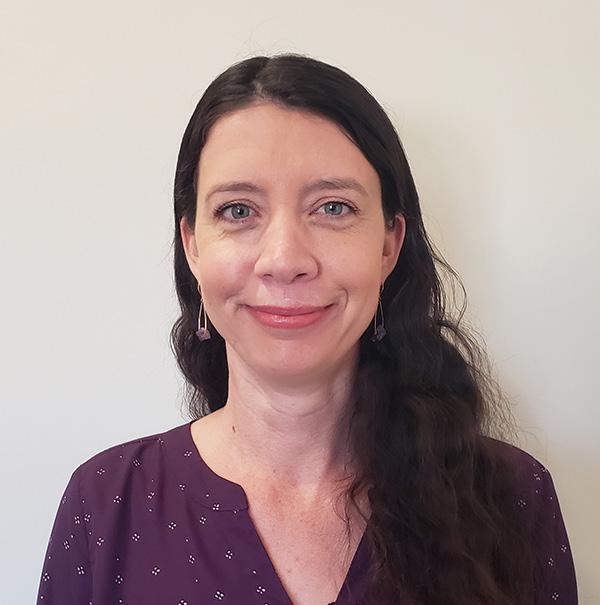


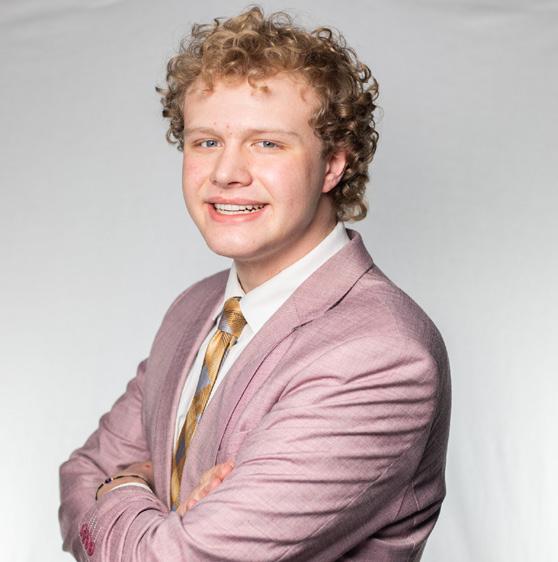
I feel like I’m just starting this semester to really feel like an Aggie, like because this was the semester that I was like, ‘OK, I’m committing to the school.’ You know, like, committing my heart and soul into the school.
Why do you feel it is important to include and support students across USU statewide campuses?
Because we can learn from each other. I feel like we’re all going through like similar experiences of stress, with, you know, just like our work or life-school balances. And I think we can all like, learn from each other, not just stay in our own little bubble of our campus. And I’ve already met many wonderful people on other campuses, and they’ve helped me immensely on my journey. And so I think it’s just — we’re all resources that need to be tapped in from each other and use in a positive way to build each other up.
I actually started out as an Eagle. I don’t know if everyone knows this, but I went to the Price campus of Utah State and was there for two years. I was able to be on the dance team down there, which was awesome, and I also got involved with USUSA down there and served as the Eastern student advocate. Down there, I was able to really get involved and learn what it meant to be and have a college experience, but to be an Aggie — when I got up here and felt that community spirit and the real family that is up here with support and through community that we have created through traditions and through just general school spirit — that’s when I found out what it truly meant to be an Aggie.
It is so important to include our students across the statewide campuses. Having been a Utah State statewide student, I have felt the outreach that has come from the main campus and that this statewide system has provided for people’s lives who wouldn’t normally be able to go to college traditionally without our statewide system. And I think that everything that our statewide system has provided has been able to reach people and has given them the opportunity to be an Aggie and to pursue that education, because they have such amazing and inspiring goals that Utah State can truly help them achieve.
I felt like I was an Aggie when I first went to a football game, how unified everyone was at the football game. And then also, that first week of classes, I felt like I was an Aggie. I remember asking someone directions to one of my classes, and they were immediately able to help me, and it just felt like, you know, everyone on campus was friends.
I feel like inclusion and our statewide campuses are a big part of Utah State University because obviously we’re not all here in Logan, and having that sense of belonging and that your voice is being heard is important to everyone.
I think it was my very first week of coming to USU, I was friends with the current humanities and social sciences senator, and that very first week he asked me to be on the humanities and social sciences council. What I loved about that was I was now — I felt like a much bigger part of the university, like I was able to give back more, like I was able to do more for the students, and that brought me a lot closer, both with them and the university as a whole.
So we have about — it ranges between 13,000 and 18,000 students on Logan campus. That’s a decent majority, but it’s not the vast majority of students that go to USU. We also have around 10,000 students that go either online or to our various statewide campuses. I had the opportunity this summer to visit every single statewide campus, from Price to Blanding to Moab, all these, and everywhere we went, there was this major disconnect between the students and the university. They went to USU, but they weren’t Aggies — or Eagles, if you’re from Price — and that’s really disheartening to see because I love being an Aggie so much. I know everyone else I know loves being an Aggie so much. To see that disconnect between us and the university was really sad, and it’s something that I want to try to fix in my time as executive vice president, which is a statewide position.
Interviews conducted by:
Caitlin Keith Aubrey Holdaway Maren ArchibaldIf you are not elected, how will you continue to be involved at USU?
If I am not elected, I still just kind of love everybody there. I love — I don’t think anything will change. I’ll just keep on, you know, bonding with everyone there. And there’s like I said, there’s just a, just a lot of great resources in the staff — the faculty see the students there. And I’ll just keep on supporting them however I can and learning from them.
Candidates’ answers exceeded the space given. To read the rest of the interviews or view their responses, scan the QR code.
How would you handle disagreements with other USUSA officers and how would you handle making difficult decisions that may go against the other officers?
I think it’s just really important to just listen, listen. We live in a world where we don’t listen, we argue, and we say our views louder and louder than the other person. And I think trying to listen and figure out where they’re coming from, and then trying to suggest if there, if I think there’s maybe a better course we can follow, suggesting it and then yeah, and just kind of trying to work together. Remember, we’re all on the same team, and we all have the same common goal of trying to, you know, be happy and healthy in our journey of being students.
If you were an Aggie Ice Cream flavor, what flavor would you be and why?
I am rocky road. Because I did. It was a very rocky road to get to Moab, and then my rocky road to even decide to go down this path of nursing. But I know in the end, it’s going to be super delicious. And you know, I’ll be, I think it’ll just be very satisfactory in the end like rocky road ice cream is to me.
I have always loved to be involved, and I think honestly, if I weren’t elected, I would love to continue. Currently, I’m on the traditions committee, and I have just loved being involved with events. Events are so much fun, and I think that that has been such a great opportunity for me to meet so many people and to just create lifelong memories for students and with students. I’ve been able to obviously be right there with them, which is awesome. But I, having been a USUSA officer on a statewide campus and then having been on an events committee up here, I think I’ve gotten to be a part of two different experiences but amazing experiences, and I really wouldn’t trade that, so I’d love to be still involved with events.
How I would like to handle disagreements or challenges that come up as a USUSA officer with other officers, that all have a growth goal in mind — I think to utilize that basis of growth and that we all are coming from a place of wanting to improve and wanting to have that strength and that building upon each other, and I think that when we all acknowledge that everyone wants to grow and improve, that’s when real growth can change things and can improve things. But I also think that being able to keep things professional, keep things so respectful, because we all have something to bring to the table, and I think if we acknowledge that, we’re able to get to the root of an issue, a disagreement, of anything, more productively than if it were to come to more personal things or things that don’t really relate to what we’re looking at, at hand.
If I was an Aggie Ice Cream flavor, oh, I don’t know. No, I do know. I do know. I love the Aggie Joy, for a couple of reasons. I think this applies to me very well. Honestly, all my life, my mom has always told me, she’s like, ‘You are the smiliest and like, most bubbly person ever.’ So Aggie Joy for one reason, but I love coconut. I love dark chocolate. I think that’s like a nice pairing that’s like subtle but also like classic, and I love being classy. I love doing things that are, I don’t know, a little elevated. I’m very — I love getting ready, I love getting fancy and yeah, Aggie Joy, for sure. And I think it’s one people sometimes underestimate, but don’t underestimate me.
I love being involved at Utah State. I’m currently part of the activities committee for USUSA and I’ve — in the past, I’ve been part of the Student Alumni Association, other clubs, so I love being involved. If I’m not elected, I’ll still be involved, and I’m still going to support those who are elected.
I think first and foremost, it’s important for everyone’s opinion to be heard. You know, I don’t think you can understand fully what someone is saying unless you first hear their side, so I always seek to understand other people.
If I was an Aggie ice cream flavor, I’d probably be That Blue One, because it just tastes like Froot Loops.
So I am in a fraternity, I am president of the Greek Honor Society here. While fraternities get a bad rap, the one I’m in and most fraternities here on campus really care about giving back to this university. So that’s one way I’ll continue to be involved in FSL, and by extension, the university. I’m also going to be helping out the next CHaSS senator, the person who will take my position next year, making sure that they have every opportunity they want, making sure that they can run things, that I can teach what I learned and help them avoid the mistakes I made so they can get immediately on the job. I will continue serving on various councils and committees that I’m already on, like the Student Alumni Association, like CHaSS Council, like just so many things.
As a current USUSA officer, I have had my differences with a lot of them already. And it kind of just goes back to knowing everyone’s why, knowing why everyone is in the positions they are in and why they’re doing what they do. Once you know that and you’re kind of on the same level — because at the end of the day, most of us who are in student government care about students, and we’re trying to help students. Once you understand that, you have that in common with the other officer who may have a disagreement. You’re able to build on that and figure out with them, ‘Hey, I don’t like this for students,’ or ‘I don’t like this for this students,’ or ‘I really like this for students’ and kind of build off that without getting mad at each other because you both realize you’re just trying to do what’s best for the students of the university.
The butterscotch flavor. It’s fantastic. I love caramel. I’m a very sweet person. I feel I have a major sweet tooth, and it’s the sweetest one, so I love that. I’m also obsessed with “Harry Potter” and Butterbeer, and that kind of helps me get my fantasy kick in. I’m also really blonde, and my hair is curly and twirly and ripple-y, so probably butterscotch ripple.
*Candidate interviews are printed in the order determined by Utah Code Section 20A-6-305.




How will you help lead the student body to make an impact in the community and in the state?
I think the biggest thing when it comes to being a leader at this school specifically is being available; being able to talk to people when they have concerns, when they have issues; being approachable, and then being able to take action. I’m an advocate just in my general life for people who are unfortunate. I do volunteer at treatment centers. And it’s easy for me to just get in a herd of people who want to help.
What do you see as the most important part of being student advocate VP?
The biggest thing is about being there for people, being there to help when somebody has an issue or concern that they don’t feel like they can get addressed with the community with the administration. I want to be that link. I want to be that link between that problem and then the solution that the administration might have or other students who have experienced this.
I will help lead the student body to make an impact locally and in the state by championing accessibility. It’s really important to me, but this role in particular is really unique as far as any student office goes because it’s the one that has the most to do with local and state government. We work really closely with representatives. And so by being involved, by being aware of policies that affect our students, and then by creating a more accessible campus.
I know this sounds kind of redundant, but advocating for students. Pretty much all of the grievances come through the student advocate’s office. So getting to hear what students care about and how we can make their lives better is easily the most important part of the role.
I will help lead the student body in the community and the state level by leading with compassion and really focusing on personal connections with the student body and focusing on their needs, their thoughts, their opinions — what they want.
I think the most important part of being student advocate VP is really focusing on advocating, which sounds silly, but really being there — understanding what is important to the students, finding a way and putting a plan in place to get that to happen.
I will help the student body realize the power of their voice in knowing that they can make a change here on campus and at the state level.
For me, the most important part of being a student advocate is listening to what the students have to say, their opinions, and helping them feel that their voices are heard.
Interviews conducted by:
Heidi
Bingham Ashley Dorius Cameron CarnesHow will you extend your support and advocacy to students at USU’s statewide campuses and regions?
I am actually a Wasatch student, so I do a lot of traveling anyways. This is, in the last couple weeks, like the third time that I’ve been up to Logan. I come back and forth all the time; I have friends here. Just being available to drive and go back and forth.
Candidates’ answers exceeded the space given. To read the rest of the interviews or view their responses, scan the QR code.
If you are not elected, how will you continue to be involved at USU?
If you were to perform at PoBev, what would you do?
Wherever they need me, man. I just love this school, and I love the values here. I love being a part of this group, and I love helping in whatever way I can.
I would probably go back to the classics. I’d do something like Shakespeare. I like “Hamlet,” personally. “Romeo and Juliet” would be cool.
I will extend support to the statewide campuses frankly by just meeting their other student advocates. It’s something that’s really important to me that they feel involved and connected as part of the Utah State family. Within this election, I’m meeting with a few other leaders on campuses that are running for different positions. But I would like to invite them to the Council of Advocacy, which is a role co-sponsored by the College of Science and student advocate, and so I would love for them to sit on that council as chairs.
If I’m not elected, I will always be involved. I love this school. I hope that if somebody else wins this position that they would still have me on the Government Relations Council. I’ve served on it for the past three years, and it’s a role I feel incredibly passionate about. It’s a role that works the closest with government, both local and state. And so I hope to be involved in that capacity, but I will always be service-oriented, and I hope even to live my life in a more inclusive manner.
I will extend my support and advocacy to students at statewide and regional campuses by staying in contact with leaders in those campuses — ambassadors, statewide vice presidents — and also, I would hope to be making visits there every so often to just check in and see how you’re doing, make a connection with the students.
I will help extend my support to students here at the Logan campus and other statewide campuses through listening to what they have to say, through MyVoice, through additional surveys and forms that they will have the option to fill out.
I’d hope to join one of the committees — events or series or traditions. I love being involved. I love being in the thick of all the events. It’s super exciting to me. I love being busy.
I’m a terrible viola player, but it’s the only instrument I know how to play. It’s like the abandoned stepchild of the strings family. But I think I would play like, you know, the Mii theme song. It’s like the da-da-da-da. I think I would do that on the viola.
If I’m not elected as student advocate, I will continue to be a present student at Utah State by attending athletic events, going to club meetings and being a supporter of USUSA.
If I were to perform at PoBev, I think I would perform hopefully an original song, but I’d have to work on knocking one of those out first and really finishing it.
If I was to perform at PoBev, you already know I would be performing the cowbell. Smacking it as hard as I can and singing the lyrics to “All Star” by Smash Mouth.

3:45 p.m., TSC Ballroom
Join President Elizabeth Cantwell and USUSA Student Body President
Abraham Rodriguez for a discussion
Utah State University is proposing an increase of $6.39 on the Logan campus. There will be no increases on the Statewide campuses.
All concerned students and citizens are invited to a public hearing on the proposed adjustment to be held in the TSC Ballroom on Tuesday, March 5, 2024 at 3:45 p.m.
This hearing will be broadcast to all USU campuses through aggiecast.usu.edu.

 By Essence Barnes LIFESTYLES REPORTER
By Essence Barnes LIFESTYLES REPORTER
The Engineering Student Council at Utah State University hosted the annual cardboard boat race on Feb. 21 in celebration of Engineers Week.
The hosts of this year’s event are Jace Collard and Andrew Gaudette, both current members of the E-Council.
“Boat racing is a very exciting event — in fact I’d say it’s the biggest part of EWeek,” Gaudette said. “I think it’s a great way to show your school spirit.”
According to the hosts, the goal is to build a boat and paddles out of cardboard and duct tape. The boats compete in a series of challenges: a race, a floating challenge and a design competition. Teams of at least two or more are required.
The club had planned to adopt a new challenge this year, the dodgeball challenge, but they decided against the addition because the boats don’t tend to last long in water.
“Even after the race, a few have already sunk,” Collard said. “That’s as many events as we can see working where there’s going to be enough boats.”
Prizes will be awarded to the fastest boat and the boat that can hold the most people for the longest amount of time. The audience will decide who wins the design competition.
The teams this year consisted mainly of clubs under the College of Engineering.
“We know that every club of engineering is doing one,” Collard said.
Registration for the event was open to anyone.
“It doesn’t have to be only engineers,” Gaudette said. “Any student is allowed to compete during this event.”
Other members of the E-Council will be participating in the event, led by Adam Barney, the membership director.
The cardboard boat races are a part of a larger

celebration for Engineers Week, which is celebrated nationwide, from Feb. 18-24.
According to the National Society of Professional Engineers, “EWeek promotes recognition among parents, teachers, and students of the importance of a technical education and a high level of math, science, and technology literacy, and motivates youth, to pursue engineering careers in order to provide a diverse and vigorous engineering workforce.”
Many of the other clubs under the College of Engineering are holding their own events and activities for EWeek. Some events include a pinewood derby, an ultimate trivia night and an egg drop challenge.
“This week is just a way to give back to all the engineers,” Gaudette said.
According to Barney, EWeek is a great way for the community of engineers to come together and support each other, especially within an educational field that is so demanding.
“A lot of engineers don’t realize that there’s an engineering community,” Barney said. “Part of it is that engineering’s hard, and you get busy and there is a lot of homework.”
Barney said because of the challenges that come with engineering, retention for the community is dwindling.
“A lot of engineers would benefit from getting involved with the community like meeting other engineers, making friends and just being aware of the support group you have,” Barney said. “People you can reach out to for help, and also just feeling more connected to the College of Engineering.”

Essence Barnes is a first-year student. She enjoys reading, writing and spending money she doesn’t have on coffee.
— a02413313@aggies.usu. edu
My name is Tanner Collins. My show, T-Time, is a variety show — basically a synopsis of my favorite music I’ve heard the past week before the show. Every once in a while, I drop a theme in. T-Time airs every Wednesday at 5 p.m. on Aggie Radio 92.3 FM.
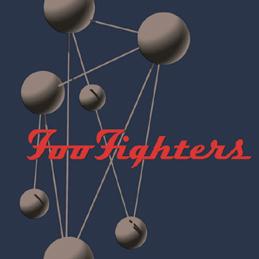





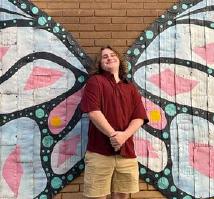

The Beatles

Save The Baby Enumclaw

From The Start Laufey

Paul Revere Noah Kahan

According to a study conducted by Oxford University, one-fifth of the U.S. workforce are “in occupations that will likely shrink.” Utah State University’s Entrepreneur Leadership Series aims to provide students with the skills to start their own business in a rapidly changing job market.
Michael Glauser, a professor in the Jon. M. Huntsman School of Business, helped create the series.
“Students might need to know how to create their own jobs someday,” Glauser said. “We think everyone needs to look at entrepreneurship as a possible career option either now or later in their lives.”
The series is a one-credit class featuring business owners and entrepreneurs from across Utah on Wednesdays from 6-7 p.m. in the Eccles Conference Center. The presentations are open for anyone to watch. Aspiring entrepreneurs can learn how successful businesses rose to prominence by sitting face-to-face with the minds behind the companies.
“The best teachers of entrepreneurship are the people who have actually done it,” Glauser said. “So 13 years ago, we created this series where we bring a successful, prominent entrepreneur to campus once a week.”
The different kinds of successful businesses operating today are vast, from media companies and lifestyle brands to vintage clothing and musical groups.
“We try to bring a wide variety of speakers,” Glauser said. “Older entrepreneurs, younger entrepreneurs, men, women, tech and healthcare companies, entertainers — we want the students to see there are lots of different ways to get into business.”
According to Glauser, the series is the introductory course for the Center for Entrepreneurship, which teaches students basic skills to get a business up and running. “We think every student should consider self-employment an option,” Glauser said. “We’re seeing so many
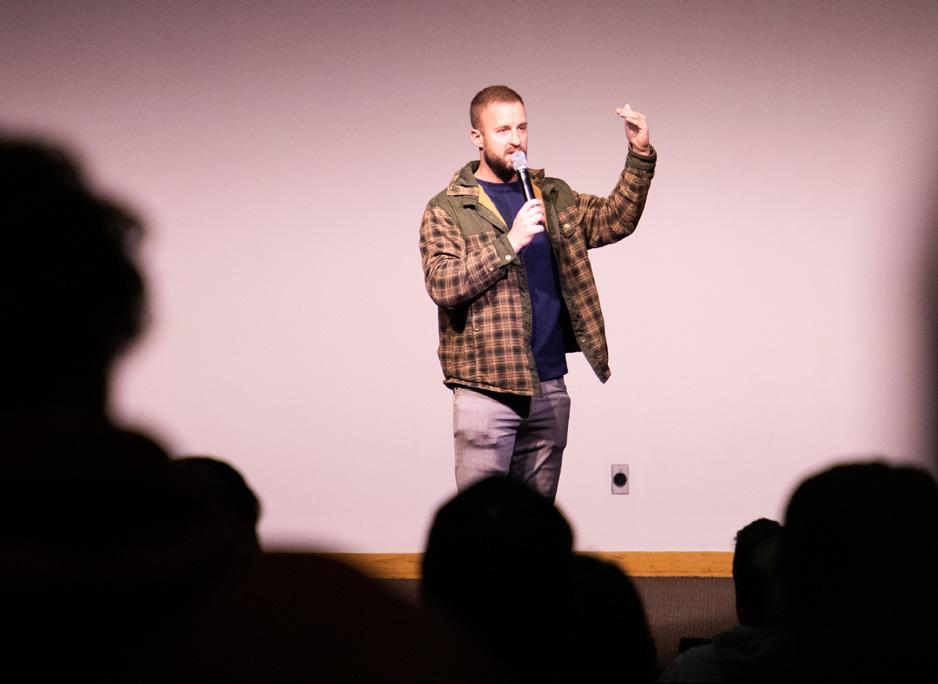
changes in the job market with occupations going away and new ones arising.”
USU alumnus Travis Chambers is the founder of Chamber Stays and Chamber Media. Chambers told the story of how he became a business owner and spoke about all the discoveries he’s made for his presentation on Feb. 7.
According to Chambers, it all started with a viral video, “The real meaning of mph.”
“I looked like a jerk, and she didn’t look super bright,” Chambers said in his presentation. “We were on Tosh.0, Good Morning America and World’s Dumbest.”
The video made Chambers and his wife $60,000 and gave Chambers an in to work with major brands such as Kraft, Coca-Cola and Old Navy.
After working as a social media director for 20th Century Studios, Chambers would start advertising agency Chamber Media.
After initially dropping out of business school and switching to journalism, Chambers discovered the importance of working with whatever life handed to him.
“This is really the heart of entrepreneurship,” Chambers said in his presentation. “It’s what Bob Ross calls ‘Happy accidents.’ He’ll make a mistake, he’ll run with it and it becomes something that really belonged there.”
According to Chambers, entrepreneurs cannot let disadvantages end the business.
“As things went wrong, I took my disadvantages and turned them into advantages,” Chambers said in his presentation. “If you can understand that these accidents and disadvantages are where all your innovation comes from, then you will be able to succeed.”
According to Glauser, another challenge young business owners typically face is lack of funding. However, Glauser argues that entrepreneurs should not let this barrier stop the business from growing.
“People think they’re limited by funding, but that’s just a myth,” Glauser said. “You don’t necessarily need money, but you need resources.”
The Center for Entrepreneurship and the series seek to help students get their ideas off the ground in realistic ways.
“When students come to us with a great business idea, we ask if there’s a small way to test it without spending a lot of time or money, to make sure you’re working on a problem people will pay money to solve,” Glauser said.
Chambers urged students to pay close attention to how change is occurring, whether it’s radical or incremental.
“100% of my success has come from choosing the right industry,” Chambers said in his presentation. “Choose something that is in its early stages. You don’t want to be in an old growth industry.”
Chambers’s next endeavor is two experience-driven hotel properties in Utah and Puerto Rico.
“The premise is, ‘Can we make a hotel that makes you feel like you’re in a movie,”’ Chambers said. “A hotel that makes you feel like you’re in a simulation or in a theme

park, but you have the whole place to yourself.”
Logan James, a finance major, and Ellie Cram, a marketing major, spoke for the series on Feb. 14. James and Cram are the faces behind ThriftJam, the white bus carrying thrifted classics that frequently appears near the Quad.
James and Cram founded ThriftJam in their first year at USU.
“We started as a normal vintage seller,” James said. “We went to a lot of flea markets, farmer’s markets and things like that. It was fun, but we wanted to find a way to actually make a business out of it.” Read

Lacey Cintron is majoring in psychology. She loves learning about the human mind, sharing stories and naps.
— a02388032@usu.edu
The Bringing War Home Project aims to connect the Utah State University community with the history of war and the people who fought in them. By hosting discussions of gender equality in the military and collecting stories from veterans, the project memorializes lives lost while revealing the formerly invisible narrative of women in war.
A hallmark event of the project is the Women and America’s Vietnam War Symposium, meant to highlight the unique experience of women during the war.
The symposium is set for March 1, from 9:30 a.m. to 5:30 p.m. in the Eccles Conference Center.
The symposium features speakers with a range of perspectives on the war, from veterans to refugees.
Thi Bui, Susan O’Neill and Kara Dixon Vuic will share readings and perspectives on the significance of women in the Vietnam War.
Susan O’Neill, who served as a nurse, will present a reading of her book “Don’t Mean Nothing” at the symposium, which offers a female perspective of the war loosely based on her own experiences.
“It’s a collection of short fiction pieces centered around hospitals,” O’Neill said. “It gives you a picture of what it was like for nurses and doctors during the Vietnam War.”
March 8, 1965, marked the beginning of U.S. involvement in the 19-year long conflict known as the Vietnam War. O’Neill was 21 when she began serving at Fort Sam Houston in Texas.
“To be a nurse, in my day, meant getting a cheap education,” O’Neill said. “My parents couldn’t have paid for college. I didn’t go because I wanted to be a nurse per se, but it got me out of my hometown and got me an education that I could use afterwards.”
Education was one of the biggest reasons women entered the war effort. According to the Vietnam Center and Sam Johnson Vietnam Archive, women often volunteered “to receive training and an education,” to work alongside men who were drafted or to prove themselves.
The women’s liberation movement arose alongside the Vietnam War in the late 1960s, taking inspiration from the Civil Rights Movement and anti-war sentiment. Protests and new ideas regarding feminism would characterize this era of change.
Kara Dixon Vuic is a professor of war, conflict and society at Texas Christian University.
“This is the era of women marching in the streets for equal rights,” Vuic said. “You have women doing all kinds of things and going to war in Vietnam, doing important things there.”
The war involved women in a way largely unprecedented, reflecting societal shift at the time.
“If you’re fighting a war, you’re going to let a lot of things slide,” Vuic said. “You might have thought wom-
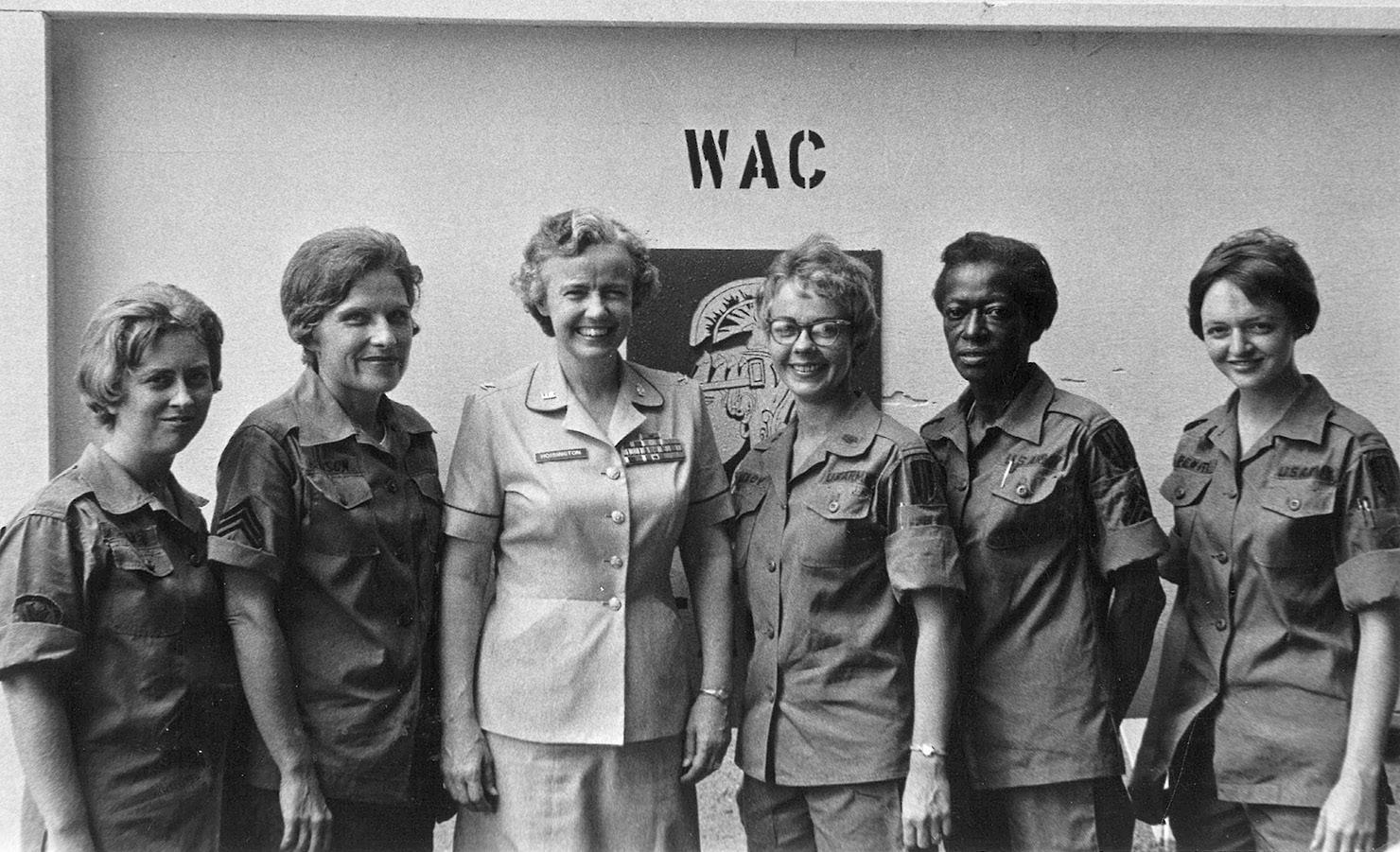
en do this or don’t do that, but war opens up opportunities for all kinds of people to contribute.”
O’Neill took part in protests and fought for gender equality when she was recruited.
“At that time, I was playing my guitar at coffee houses and singing protest music at various campuses,” O’Neill said. “I was not excited about the idea of going to Vietnam, but they lied and I had to go.”
O’Neill served at three different hospitals in Vietnam, the first two being some of the smallest units in the area. American women mainly served in the Army Nurse Corps or the Women’s Army Corps.
“After the first hospital closed, I served at the second hospital for three months,” O’Neill said. “The attitude was terrible. We didn’t get as many soldiers as we did locals who were injured, often by us.”
According to statistics from American War and Military Operations Casualties, estimates of Vietnamese casualties range from 966,000 to 3 million while U.S. casualties total 58,220.
“The attitude there was ‘Why should we open our doors to these people?’” O’Neill said. “Because you’re creating a war on their turf.”
O’Neill moved to a larger hospital near South Vietnam’s former capital city Saigon, now known as Ho Chi Minh.
“I got transferred to what my commanding officer said
would be the worst hellhole in Vietnam,” O’Neill said. “But actually it was a great team of people, and I really felt that I was of much better use there than where I was.”
According to Vuic, women have always faced unique challenges when it comes to the military.
“They were joining an organization that was built for men,” Vuic said. “The military was constructed around men’s bodies, men’s needs, around social and cultural ideas of what men do.”
O’Neill said being a woman in what was essentially a man’s world was incredibly difficult to navigate, especially when it comes to sexuality.
“You represented so many things to these guys,” O’Neill said. “We’re thrown into this situation that’s totally untenable in terms of what the adolescent mind is going through, in terms of your self-image and sexual being.”
O’Neill said most people serving were in late adolescence, ranging in age from 19 to 24. Patriarchal perspectives regarding women’s role and autonomy within society have had severe implications for women, especially for those fighting for a place in the military.
Read the rest of this story at usustatesman.com
— a02388032@usu.edu
The seventh annual Paper and Clay Exhibition opened on Feb. 5 and will go through March 1. This exhibition takes submissions from all over the country to showcase in Utah State University’s Tippetts and Eccles art galleries.
Maddie McHugh; senior in fine arts with an emphasis in ceramics, is a student at the University of Mississippi who said she was happy to find out about the exhibition from two of her professors.
According to McHugh, the combination of paper and clay was an interesting idea she hadn’t seen before.
“I really wanted to try and submit a piece of work to the Paper and Clay show because I really like focusing on incorporating my wheel-thrown pottery and also printmaking techniques,” McHugh said. “It’s a perfect in-between of the two.”
McHugh’s ceramic piece, called “Enjoy it!” is inspired by her days serving as a waitress in New York. She said she now enjoys serving through her art, not in a restaurant.
“I realized that functional pottery wasn’t what was communicating my message about my experiences in a restaurant,” McHugh said. “So I decided to make functional poetry and then eventually break it.”
McHugh added in the printmaking techniques to convey the stress of working in the restaurant business.
“This just solidified my meaning and my intention with my work,” McHugh said.
Sarah Miller, first-year graduate student in the Louisiana State University ceramics department, heard about the exhibition from another graduate student.
Miller’s piece, called “Home Team,” explores the complicated relationship with her family in baseball.
“Sports has been a big deal for my family, and it’s not something I’ve always gotten necessarily,” Miller said. “Baseball has been a kind of touchstone and misconnection point for a lot of the interpersonal relationships.”
UTAH STATE
2/6/24
- A member of the USU community reported the possible loss of a keycard. The complainant later found the missing keycard and updated USUPD.
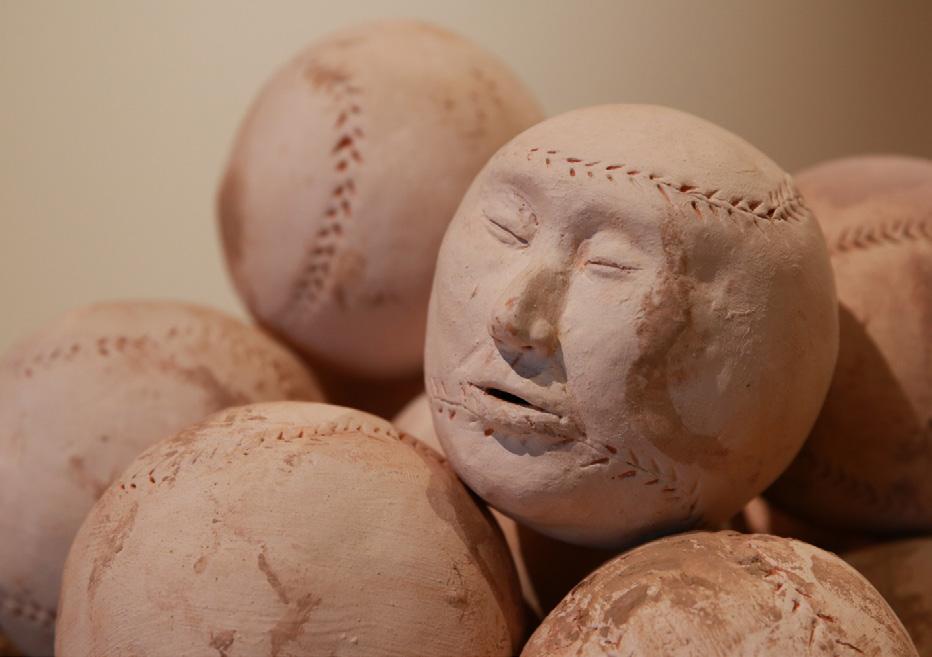
Miller’s piece is also made of clay, which she said is one of her favorite mediums to use when exploring memories.
“Clay is going to hold every single fingerprint that you put into it,” Miller said. “It’s me trying to figure out how I can connect with my family over one of the few ways they know how to connect with people.”
McHugh had a background heavily influenced by sports as well. She decided against getting a studio art degree her first time through school because of athletics.
“I had an athletic scholarship to run cross-country and track,” McHugh said. “I traveled so much with athletics, and the time it took for practices, I would have not been able to really learn my craft and do art justice.”
However, McHugh eventually stopped doing sports and decided her art history degree wasn’t enough. This is what prompted her to go back to school and pursue a degree in fine arts.
McHugh said her degree in art history has been helpful as she continues making pieces.
2/6/24
-First-aid was requested for an individual at the ARC. Officers administered aid to the individual, who declined medical transport and left with a responsible party.
- A suspicious odor decribed as “possibly a controlled substance” was reported. Officers responded to the location and found no evidence of criminal activity.
2/13/24
- Turkeys were reported as being a nuisance around campus. Turkeys are protected under state law, and no action can be taken unless the bird becomes aggressive.
“I always appreciate the history of it,” McHugh said. “Learning from the other greats who have made work that has influenced me so much is so important.”
According to Miller, art can be a form of communication, and it’s one she tries to harness in her work.
“Art has always been a great way to have conversations with others when words fail,” Miller said. “I believe nothing else can as it can provide such a fantastic kind of intimate impact for the viewer.”
Miller said the impact of art is especially apparent in academic institutions.
“It can communicate research or personal experience,” Miller said. “It can build bridges where you wouldn’t think there would be.”
McHugh said art has been incredibly important in her life, especially in her collegiate experience.
“Art to me is everything about not only producing work that is so influential to you but also something that resonates with the people who will look at it,” McHugh said.
The exhibition is currently being judged to determine the winners, who receive monetary prizes of $500, $300 and $200 for first, second and third places.
The winners will be announced at the reception on Feb. 29. The exhibition is free to attend throughout the month.
For more information on the paper and clay exhibition, visit cca.usu.edu/art/events/paper-and-clay.
“More work always needs to be produced because there’s always something to talk about,” McHugh said. “It’s all very interconnected.”

Ella Stott is a first-year student studying English and journalism. When she’s not writing, she’s admiring Nebraska corn.
— ella.stott@usu.edu

2/13/24
- While on patrol, an officer came upon a deceased deer creating a traffic hazard. The officer worked with the transportation department to remove the animal.
2/15/24
- A suspicious call was made to the University Inn. The responding officer took a report from the complainant.
2/19/24
- Two dogs, one being a small brown dog and the other being a large Husky, with no tags were reported to USUPD. Animal Control found they didn’t have microchips and transported them to the shelter.
What happens behind the scenes of college sports? How many hours of prep go into a single week?
At the collegiate level, there are teams of people dedicated to making sure each program has all the right equipment on hand at all times. The Utah State sports equipment staff is in charge of operations of equipment, travel days and helping with practices.
“Anything you see players or coaches wearing on the field on game day, we’ve had our hand in it,” said Tony Lambert, assistant equipment manager.
USU sports thrives because of the magic made behind the scenes from the equipment staff. They are the wheels that keep the machine turning.
The director of equipment operations for football, Chris Dunlap, has made managing equipment a long-term job.
“I love football, and I love watching,” Dunlap said. Dunlap is in his first year as director, and he found his way into the world of equipment after having a health scare in his high school years.
“Either I could keep playing football and eventually hurt myself, or I can start doing the equipment,” Dunlap said. He has been working equipment since and has stepped his way up the ladder as the head of football equipment at USU.
The hours, including travel time, are demanding and long.
“I can usually work 40 hours in a couple of days,” Dunlap said.
Tobin Lambert, the assistant equipment manager, has been working alongside Dunlap for about a year. Lambert started as a student staff member while he worked through graduate school. Eventually, he landed himself a position as an assistant.
For most Mountain West games, Lambert explained, the truck usually has to leave by Wednesday. This means everything going to an away game must be on the truck, packed and ready to use on the Saturday before the game.
Instead of a travel day, Lambert described it more as a “travel week, not just one day leading up to it.”
When the team travels by plane, equipment staff members are in charge of unloading everything that came with them as cargo on their flight.
“All the bags that coaches, wives, support staff, donors, trainers, anybody who’s on that plane, we’ll unload their bags and put it onto the correct bus,” Lambert said. Lambert also explained they have the flight attendants announce before they land to allow all equipment staff to exit the plane first to unload everything.
The day-to-day operations of the equipment staff at Utah State change depending on whether the sport is in season or not. Both Dunlap and Lambert noted since football is not in season, days currently look a little different than they would during the season.
“If we are in season, we have our Mondays off and then that’s usually our day of prep, depending on if we’re traveling or not,” Dunlap said.
Tuesdays usually consist of helping to set up practice

equipment and looking at any gear that needs repair. Practice duties include bringing in practice dummies, cones and other things like towels for players. Wednesday is usually the day the semis will leave if the team has an away game that week on Saturday. The rest of the week consists of helping at practices and prepping for the travel day on Friday if needed.
Before the game, the equipment team checks all the gear and ensures everything is ready to go.
“We go through our helmets, and make sure there’s no scratches or tears on decals and make sure that there are no mess-ups on the facemasks,” Dunlap stated.
There are 10 students on the staff, along with Dunlap and Lambert. With only 12 people, the prep work that happens behind the scenes can pan out to be hours of work.
When it comes down to specifics in equipment and what the staff is in charge of, the numbers start to pile up. Anything and everything on the field besides trainers’ gear is considered equipment, and the staff is completely in charge of it. When asked about total numbers, Lambert gave estimates of what equipment is kept on hand.
“Right now there’s 112 guys on the roster. In season, we’ll get up to 115. Each guy has two helmets, sometimes three depending on the season,” he said.
That means roughly 230 helmets are kept on hand, not counting any backups. There are also 115 shoulder pads, one for each player, and large amounts of backups kept on hand.
Football is not the only sport that needs these vital pieces of equipment in their programs. Brady Mikkelsen, who works as the director of equipment operations for olympic sports gave another perspective to the world of equipment. The olympic sports designation means he works with all other sports besides football.
Mikkelsen is a former Aggie and loves being involved at
USU. He said he works anywhere from 40 to 80 hours a week. Granted, operations for all other sports are similar to the function of the football equipment staff.
Mikkelsen, just like Dunlap and Lambert, said there is so much prep that goes on behind the scenes, and equipment staff are vital to the function of any sport. Equipment teams are there to help players in any way they need, whether it’s about the sport, school, life or just simply wanting to talk.
“The players know that I am here to help them out,” Dunlap said.
Mikkelsen also talked about relationships with players outside of football and had relatively the same response. He said he gets to know some players more than others, but the relationships between players and equipment staff is strong.
“If you want to come up and you want to talk to us or just hang out, you know we’re more than happy to,” Lambert said. He said it is great to build relationships and see the players improve on the field.
When asked about motivation on what keeps equipment staff members going, it was nothing short of love for the game, players and the job itself.
“I love this job, and it makes me not want to do anything else,” Dunlap said.
He also said his motivation through long hours comes from his results. “Just seeing how the players come out and looking good. There’s a slogan that says, ‘Look good, play good, feel good,’” Dunlap said.
Utah State University’s athletic events are more than just displays of athletic ability; they’re gatherings uniting fans, athletes and coaches. Behind the scenes, a collaboration between USU campus police and the athletic department ensures the safety of all attendees.
Erik Christensen, administrative sergeant for USU campus police, explained the delicate balance between providing security measures while maintaining minimal intrusion.
“We don’t want to be obtrusive, but for a football game, for instance, it’s a massive process with lots of moving parts, so we do a lot of intel every week,” Christensen said.
Regular intelligence work, focusing on threat assessment and preparation, forms the cornerstone of the proactive approach, allowing them to foresee potential risks and devise effective strategies to mitigate them.
DJ Eckman, assistant athletic director for operations, elaborated on the athletic department’s role in ensuring security. His main objectives are to take care of teams and officials and work with officers on the field to mitigate any threats.
Other roles of the department include overseeing bomb sweeps, maintaining NCAA standards and ensuring fan compliance with policies.
Months of meticulous planning precede each athletic event, especially football. During the months before a home football game, the security team gathers intel that can help them determine how much security will be needed and predict any major threats. Reaching out to the other teams and sharing any relevant information, including any controversies or threats the opposing team has received, is the next step.
During the week of the football game, the team focuses more on what is happening in the community and the expectations of that specific game.
The directive, a list of people working the game, gets all the people that are involved into a room together and discuss necessary information such as if a bathroom is out of service, because there would be more people congregated around the other bathrooms.
After gathering all the information, a threat assessment is created.
Christensen is wellinformed in the realm of data analytics and uses that to help predict what is going to happen in these games. He has taken all the accidents,
alcohol offenses and everything that has happened in past games and put them through a correlation matrix. The matrix uses shading to indicate the severity of an effect.
“In some of these darker ones, that means it has much more of an effect than the others. So, we look for the darkest squares, and notice that when the weather is colder, people keep to themselves more,” Christensen said.
This type of intelligence helps the teams prepare for each event by determining the odds of any threats or disturbances that may occur and how they will plan accordingly.
Using these analytics also helps with the physical security of the game. Christensen explained the security of a home football game can be compared to concentric
rings; the security increases as you travel to the center.
In the outer ring is the hotel where the opposing team is staying. Security will screen the buses there and escort the team to the secure zone, Maverik Stadium.
The next level is gate security. Ticket office takers, USU officers, surveillance cameras and plainclothes officers in the audience are on the ground taking note of any potential threats.
The innermost level of security is in the “sterile zone.” This includes the players, coaches and security officers that are down on the field.
Security also utilizes the USU drone team and infrared cameras throughout the game.

Contingency plans stand ready, ensuring swift responses to any unforeseen circumstances without
“We always try to have every possible scenario planned so that if we get into the heat of something, we already know what we are going to do,” Christensen
When asked about his favorite part about his job, Christensen said, “I am an Aggie through and through, and it’s important to have all these experiences and do it safely. And I’m glad to do my part to make it a safe

Addie Hemsley is a junior studying English creative writing and journalism. In her free time, she loves watching movies, reading, writing, hanging with friends and playing all types of sports.
— addie.hemsley@usu.edu
It was a strange place to send our youth, not to learn a new culture or enjoy the beaches, but to kill and be killed, to be maimed and to patch up the maimed. What I’m saying is, to us as a country, Viet Nam truly didn’t mean nothing.”
I am not usually one to enjoy books about war. The occasional tame WWII movie is intriguing, but beyond that, written works about conflict were always too graphic to pick up.
I was hesitant in approaching “Don’t Mean Nothing,” a collection of not-entirely-true short stories from Susan O’Neill’s experiences as a nurse in the Vietnam War. I was quickly redeemed of my misgivings only a few pages into this gem of a book that truly captures the emotions and day-to-day life of a hospital in Vietnam.
Most books about this war hone in on men fighting on the front lines, and while this is an important perspective, we often forget about the women who fought in battles just as gruesome.
The experience of war to a nurse is one of saving lives instead of taking them, and yet O’Neill makes it clear the battle was just as hard-fought.
The story follows a woman known as the lieutenant as
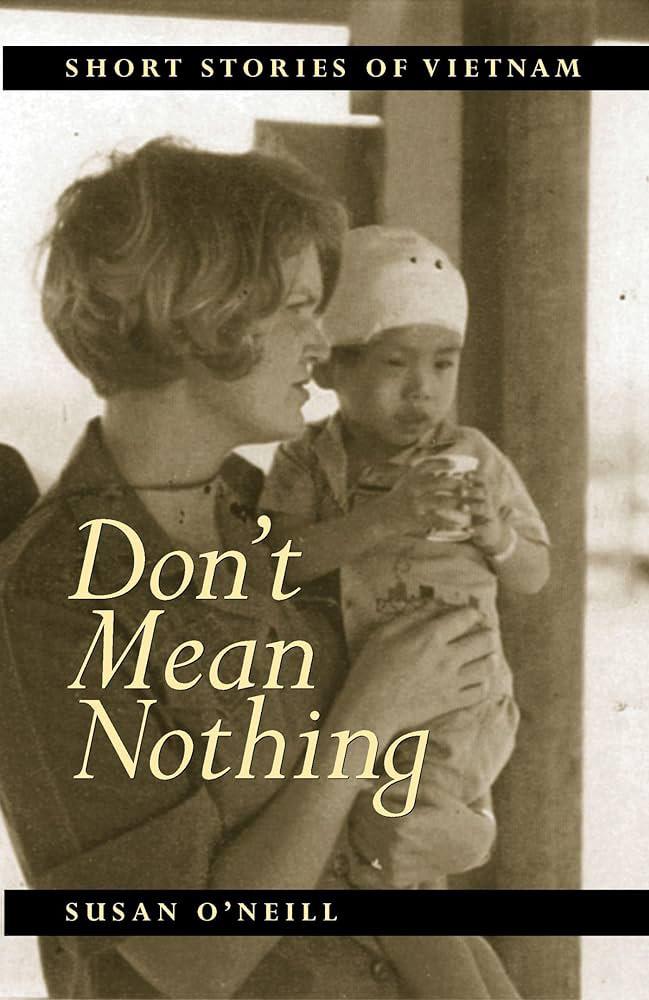
she serves in three separate hospitals. The perspective jumps between characters in each chapter to tell different stories and portray how different experiences were lived.
O’Neill’s stories may not have been entirely true, but they each hold a piece of war that is accurate in every sense. She never shies away from the vulgar language,
the war were constantly bombarded with these very concepts, and most quickly became desensitized to their horrors.
“What we’re living in—here, in this country, in this war—that’s all about death. And sin—real sin. Killing. Raping. Stealing. Hating… it’s just about every sin in the commandments, except maybe honoring your father and
It was a strange place to send our youth, not to learn a new culture or enjoy the beaches, but to kill and be killed, to be maimed and to patch up the maimed. What I’m saying is, to us as a country, Viet Nam truly didn’t mean nothing.
— Susan O’Neill
abuse of drugs, talk of sex and racism that truly existed in these hospitals, and each chapter feels like a very real step into the era. O’Neill expertly avoids the feel of a history textbook with her story and tells it how it is, so to speak.
The psychological toll of war brings to question the role of women in the conflict, which was a new concept at the start of Vietnam. Were women present to be a relief for men? To lead the hospital staff? Or something else entirely? The identity of many women had to change throughout the experiences of Vietnam, whether it was subconscious or intentional.
Women were few and far between and therefore seen as both goddesses and whores.
The army intentionally put women in higher ranks to create a power imbalance and discourage sexual activities, and though this didn’t always work, it made some think of women and female lieutenants as separate beings altogether, “when the lieutenant got cranky, he was apt to forget that she was an officer and not a woman.”
Even with this intentional divide, women in the war were often raped or seen as a way to escape reality. This led to several uncomfortable situations within the book, including a scene where women recruits sat side-by-side with male counterparts as they watched a show meant to boost morale, one of women stripping on stage.
One can’t help but notice the irony of discouraging men from considering their coworkers women, and then putting on a show where woman dancers strip for entertainment.
A recurring theme was how opinions of religion and God changed throughout time in Vietnam. Catholicism teaches not to kill, hate, steal or rape. Yet recruits in
mother. And if God goes along with it, he’s just not any kind of god that we should be dealing with. He can’t be.”
O’Neill expertly captures the desperate need for control each character feels, and the mental anguish they experience when the war rips that control away. Whether it was the ever-itching lice that were impossible to kill, an inspiring class being canceled after the professor contracted rabies, or a man having the child he was anxious to adopt be snatched away, the loss of control was ever present within the pages.
Those who went to war had different methods for coping with the sudden change in environment and culture. Characters of this story considered the U.S. to be “the real world” while Vietnam was just an in-between place. A place where, unlike other American wars, the things that happened were considered unethical by many. So, what was the point of being there? Why did the nurses work tirelessly to save lives, when so many of them died regardless? Perhaps this is why so many resorted to believing that what happened to them in Vietnam didn’t mean nothing.

Avery Truman is a sophomore pursuing environmental studies and geography. She is passionate about astronomy, writing and reading science fiction and being the lifestyles editor for The Utah Statesman.
— avery.j.truman@usu.edu



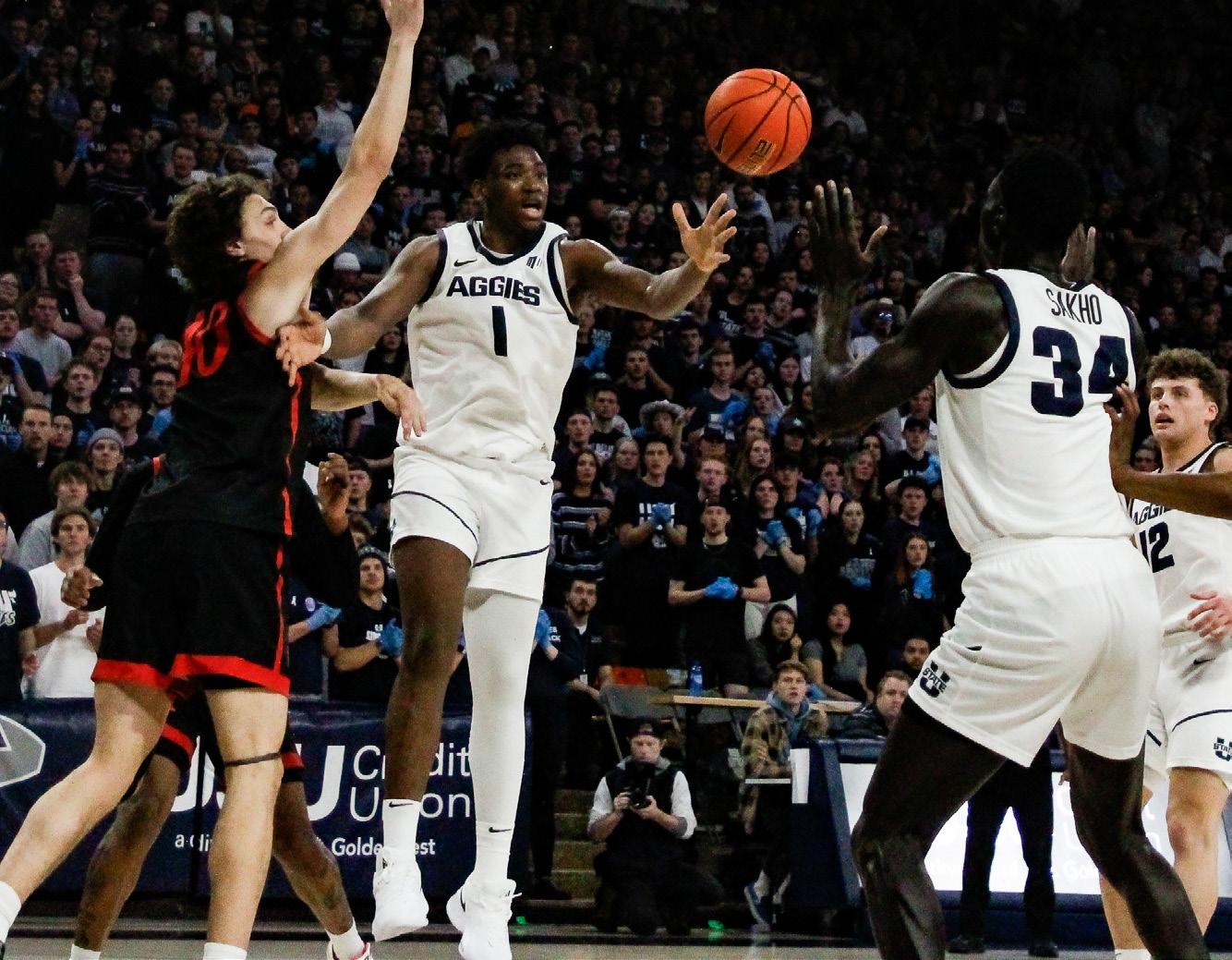



Kelly is double majoring in anthropology and broadcast journalism. She loves doing anything outside and playing the bass guitar. Her goal is to travel as much as possible, and she loves being an Aggie! —


Join President Elizabeth Cantwell and USUSA Student Body President Abraham Rodriguez for a discussion about potential tuition changes
Utah State University is proposing that there will be a 3-5% tuition increase on the Logan and Statewide campuses. No increase is proposed and for Technical Education.
All concerned students and citizens are invited to a public hearing on the proposed adjustment to be held in the TSC Ballroom on Tuesday, March 5, 2024 at 3 p.m.
This hearing will be broadcast to all USU campuses through aggiecast.usu.edu.


Last week’s solution:

Sudoku puzzles are provided by www.sudokuoftheday.com.


